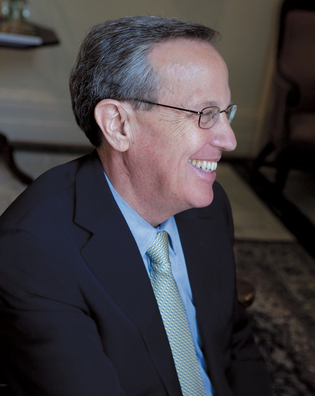 loading
loading
Q&A: Rick LevinPersonnelReflections on management, after 20 years at the helm.  Mark OstowView full imageY: How would you describe your management philosophy? L: I have always tried to hire truly outstanding people in the positions that report to me directly: officers, deans, and directors of major organizations such as the library, the museums, and athletics. I give these excellent people a lot of rope. I don’t micromanage. I try to motivate and inspire them with a general vision and then let them be creative. This strategy has been very successful. I would not trade Yale’s team of officers, deans, and directors for any other team in America in higher education. Y: What if you’ve got a great person, but there’s some part of the job they’re not suited for? L: No one is perfect, and one is constantly making judgments about people and their capacity to serve the institution. Everyone on the leadership team sets annual goals. Everyone is accountable—reporting at the end of each year on which goals have been accomplished and which have not. Then we use that information for setting goals for the next year. If an outstanding individual has a deficiency in a particular area, we work together to develop a compensatory strategy. That might involve hiring a deputy, or getting some coaching, or both. I have not hesitated to replace people when necessary, but I think I have done so in a humane and respectful way. Y: You visited many departments last spring to talk about “shared services”—the streamlining of some support services—and Yale-NUS College. L: Peter Salovey [’86PhD, now president-elect] and I went on a listening tour because there seemed to beunhappiness about some of the administrative changes we were introducing in an effort to improve services and reduce cost. We went to 17 FAS [Faculty of Arts and Sciences] departments. These were valuable con-versations. We learned a lot, and I think a great major-ity of the faculty came out thinking: they heard us. Things are on a better track now, because one of the things we decided in the wake of last year’s meetings was that, if we were going to change the way operations were managed in an FAS department, we needed to make sure the entire faculty was part of the conversation and were agreeable to the changes. Y: SOM professor Tom Kolditz has said that a good manager will take on as much or more risk than the people he or she is leading. How does that apply to university presidents? L: It is the leader’s job to articulate a vision of the future and rally everyone in support of that vision. By definition, that requires the leader to take the lion’s share of the risk and let others know that they will be supported in their efforts. If an initiative fails or if something goes wrong, the leader should never blame a subordinate. I have always tried to take responsibility, and not to shy away from being the public face of Yale when an apology or corrective action is warranted. The community expects this from me, and, besides, it is the right thing to do. Y: And now an entirely different subject: what are you going to do next? L: The Yale Corporation has given me a year’s sabbatical, and I am looking forward to using that time to think about how I might make a meaningful contribution in the years ahead. For a change of pace, Jane and I will spend the fall semester in Palo Alto, closer to our four children and seven grandchildren. But we plan to be back in New Haven by the end of the year.
The comment period has expired.
|
|